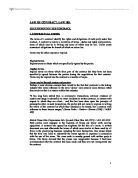Consideration - each party involved in the contract must receive something of value.
There are two types of consideration –
Executed consideration is a promise that has been performed which means that the offeror is obliged to act on their side of the promise.
Executory consideration is a promise that will be performed in the future
Acceptance - an expression of absolute and unconditional agreement to all the terms set out in the offer. It can be oral or in writing. The acceptance must exactly mirror the original offer made.
Factors which may invalidate a contract
Mistake
Mistake occurs where one or both parties believe something to be a fact when in reality, it is not true. The general rule for mistakes is that it will not affect the validity of the contract. However there are exceptions to the rule.
- When there is a mistake over the identity of the parties.
- When there is a mistake over the subject matter of the content.
- When a document has been mistakenly signed in error.
Types of Misrepresentation
Fraudulent misrepresentation was defined by Lord Herschell in Denny v Peak (1889) as a false statement “made (i) knowingly, or (ii) without belief in its truth, or (iii) recklessly, careless as to whether it be true or false”, that is to say there is absence of honest belief. - http://www.gillhams.com/articles/401.cfm
Negligent misrepresentation is when the defendant makes a careless makes a representation while having no basis whether to believe it to be true
Innocent - where one party makes a statement which he believes is true, there will be no misrepresentation and the statement will be considered innocent.
Duress – is forcing someone against their will to enter into a contract (this could either be through physical or other means). A contract made under duress cannot be enforced, for example, being forced into a legal contract at gunpoint.
Undue influence is where one person who is in a higher position, takes advantage of their power and exerts pressure on another person to coerce them into a legal contract. In cases such as this, the person being pressured is usually in no position to bargain.
For example, a relative of an elderly pensioner putting a lot of pressure on them to enter into a contract.
Pass 2
How statutes affect contractual terms
Unfair Contract Terms Act 1977
Under the terms of this act, you cannot exclude liability for personal injury or death as a result of negligence. Exemption clauses have to be reasonable, if this is not the case, the term will be void. It is not possible to exclude liability for goods that are faulty nor can contracts be altered without the knowledge and agreement of the other party.
The Electronic Commerce (EC Directive) regulations 2002
This regulation covers contracts completed by electronic means over distance.
Before the contract is completed, the seller must state in a "clear, comprehensible and unambiguous manner" the technical step involved to place an order (contractual offer). The terms and conditions must also be provided and the seller must also provide details on how to correct any input errors made. If this information has not been provided and an error has been made, the contract can be annulled.
The consumer Protection (distance selling) regulations 2000 (as amended)
The purpose of the Directive is to increase consumer confidence and so strengthen the single European market by providing an agreed minimum level of consumer protection throughout the EC.
This regulation gives consumers a cooling-off period so that the customer can have a chance to examine the service or product being offered in the same way they could when in a shop. The regulation gives the consumer the right to cancel however, the consumer also has the responsibility of keeping the product in good condition before returning it.
http://tutor2u.net/ebusiness/ebusiness-law-distance-selling-regulations.html
Unfair Terms in Consumer Contract Regulations 1999
The Unfair Terms in Consumer Contracts Regulations 1999 protect consumers from unfair standard terms in contracts. If the term is considered to be unfair, then it is no longer legally binding on the consumer. The Office of Fair Trading along with certain other bodies can take legal action to prevent the use of such terms. The UTCCRs can protect consumers from terms that reduce their statutory or common law rights and from terms that seek to impose unfair burdens on the consumer over and above the obligations of ordinary rules of law.
http://www.oft.gov.uk/advice_and_resources/resource_base/legal/unfair-terms/







